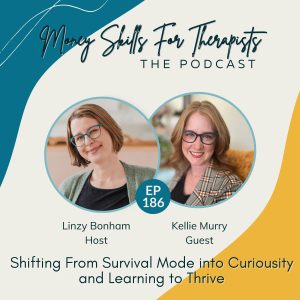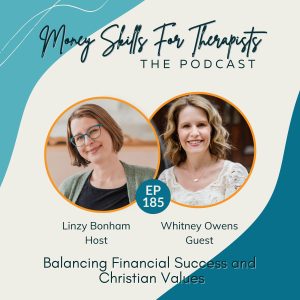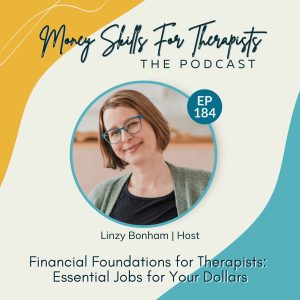[00:00:00] Linzy: Hello and welcome to our first ever episode of the Feelings and Finances mini podcast. So this podcast series is going to be second episodes that come out every week on our Money Skills for Therapists Podcast, and these will be short episodes that are all about answering your listener questions.
[00:00:20] So if you have questions for me, if there’s a situation that you have going on in your business that you’re not sure about, if you’re finding it hard to get to your finances, I would love to hear your question and answer it in a podcast episode. I know that it can be intimidating to send your questions out into the universe.
[00:00:38] On our podcast page, we have SpeakPipe set up, which is where you can leave your name and your question for me. I know it’s intimidating to do that, but I also want to remind you that by doing that, by putting yourself out there a little bit… And you only need to share your first name, and you can use a pseudonym if you want, you get the chance to hear back from me and to have it out there and actually get your question answered.
[00:01:02] So to get us started, my team has recorded some questions. So the first question that I’m going to answer today is from Ashley, our podcast editor, and here is Ashley’s question.
[00:01:11] Ashley: Hey, it’s Ashley with the Money Skills for Therapists team. I am so excited to record a question for the Feelings and Finances episodes that we will now be releasing in the Money Skills for Therapists feed. I’ve learned so much from Linzy and from all the amazing guests on the podcast as I’ve been listening over the years, but I have a question that I haven’t really known the answer to.
[00:01:36] So I am excited to pop on here and ask it. And my question is, Linzy, you have shared so much about fiduciaries and other types of financial advisors. And I certainly, now that I know a bit more and have a little more financial literacy, I recognize the benefit of that. But I know for myself, I have been putting money into kind of the, I don’t know, more traditional, financial
[00:02:02] approach. I use Edward Jones specifically. And I’ve been doing that since I was 13 and babysitting, and was like, “Oh, I can invest money. And, I actually can help my money grow.” And so I’ve had that stuff set up for a long time. So I guess my question is, what do you say to people who already have money invested in mutual funds and already have a financial advisor who is more in the sales type role?
[00:02:29] If I want to make a change, is there something I can do now to take steps moving forward, or is it too late? I think probably it’s not too late, but I guess that that is the question that always comes to my mind is knowing what I know now, what steps can I take to be more proactive in my financial investments moving forward, but also recognizing where I am on the journey already?
[00:02:54] I’m excited to hear what you have to say about that. Thanks so much for taking these questions and for giving listeners an opportunity to ask them.
[00:03:02] Linzy: Well, Ashley, thank you for your question. There’s a couple pieces to this question, and I’m going to address the pieces that are really in my lane. And then I’m going to direct you, of course, to the folks who can help you, who this is very much their lane.
[00:03:15] So, as I think everybody listening to this podcast knows, but I should make clear, I’m not a financial advisor; I’m not an accountant. I’m a financial educator. My role is to help you think about where you’re coming from, connect with what’s happening below the surface to get you moving to make
[00:03:31] informed decisions, right? So what I’m hearing, Ashley, first of all, to reflect back to you, where you have done so, so well, is that you have been investing since you were 13 years old, which is amazing. You and I, our little selves could have been friends.And you’ve been investing for so, so long, with this company, Edward Jones, and these mutual funds that what I’m hearing is there’s this probably inertia there in terms of like, well, you’ve been doing this thing for so long, literally decades at this point.
[00:04:00] Is it too late to move? What do you do at this point knowing what you know? And what I’ve noticed can come up with us when we’re more like relational people, and also just around feeling stuck around money, is it can be easy to feel like well I’ve already got this thing I’ve been doing it a long time.
[00:04:15] We can almost get this sense of like loyalty to these large institutions or like a fear of switching that we’ll like do something wrong and whether it’s a loyalty or fear we can feel stuck in these relationships, a little bit like beholden, or that it’s just easier to stay there than it would be to leave. So what I want to remind you of, Ashley, is that it’s never too late to make switches that are going to improve your financial health and… This is outside my lane, again,
[00:04:46] but mutual funds tend to have a much, much higher management rate. So the amount that you pay to have those be actively managed by somebody is usually well over 2%. And 2 percent of your money over like the long, long, long term, over decades, ends up being a lot of money. So you still have decades to go, Ashley, before you retire.
[00:05:08] And I know that because I know you. And so, taking the time to decide what you actually want to do with your money, and making a switch now will have literally decades of impact on how much money you’re going to have when you go to use that money in retirement or in your later years. So, I would say the first thing to do is to get clear about how much it is costing you to have these investments where they are now.
[00:05:31] This is about grounding yourself in where you are, right, rather than just making an emotional decision. I’m going to encourage you to start by looking at the numbers and, find your statement, look at what your MER is, which is the management rate that you’re charged, and see what that percentage is.
[00:05:47] And then you could probably find online. There’s so many great resources around this stuff online. Look at an investment calculator for the MER rate for what you’re currently committed to with Edward Jones, and see over the course of the next week 30 years, how much money is that going to be?
[00:06:02] Based on how much money you’re paying them to management, how much money is going to go towards this MER that you’re paying? I think that’s going to help you to ground in the fact that this is worth making a change. Then when it comes to making a change, this is where bringing in another professional to guide you is a great idea.
[00:06:21] So you have a relationship with somebody right now who, as you say, is in more of a sales role, more of that,old school financial advisor who is also benefiting from you having money in certain places or from selling you certain products. Finding a fee-for-service financial advisor is a great place to start to recalibrate your picture, get somebody’s eyes on your situation to look at like, where are you right now with your goals?
[00:06:43] Where do you want to be? They can help you create that big picture perspective, and then they can also help you start to think about where you want to put your money. I’m a big fan of ETFs. That’s how my partner and I invest, and to learn how to invest in ETFs, we literally learn from blogs on the internet.
[00:06:59] So um, Millennial Revolution is a great blog. They’re a couple from Waterloo, Ontario, so in my neck of the woods, who retired in like their early 30s, saved up a whole bunch of money, and they have some really great blog articles that teach you all about ETFs. How to invest them in a balanced way… The approach now to investing, Ashley, that most folks take is like put your money in everything and then leave it.
[00:07:25] Right? So think about your risk, how much risk do you want to be taking? And then spread your money out over a bunch of different stuff so you don’t have all your money in Tesla or all your money on the American stock exchange. Spread it out and then just leave it, but you’re going to be paying a much, much, much lower rate.
[00:07:41] And that’s where it’s really going to make a big difference for you financially, Ashley, is by having that lower rate. And we’re talking about like tens of thousands of dollars, if not more, over the next few decades, right? So this is one of those things where it’s really worth it to take the time, ground in your numbers.
[00:07:57] Not surprising that that’s the first piece of advice that I’m giving. Look at what you’re paying now. Look at what would happen if you were paying 0. 2 or 0. 1 percent instead for an MER and then look at getting the support in place so you feel like you can confidently make that switch to maybe managing them yourself.
[00:08:17] You can also put your money into large ETFs that are just kind of like a mix of all sorts of different investments. But I would say, ground in your numbers, look at getting support, look at getting a financial advisor who can help you look at your big picture, educate yourself, do some learning, and don’t let yourself get stuck in inertia.
[00:08:34] Because you’ve been with this financial institution, I see this happen with banks sometimes, too, where we feel weirdly loyal to our banks. You need to be thinking about what is best for your family’s financial situation and tens of thousands of dollars, or even more in the future, is what is much more important than the friction of switching now or some of the learning that you’re going to have to do.
[00:08:56] So that’s my advice. I’m excited since I know you, I’m going to get to hear about your journey and what you decide to do with this. And thank you so much, Ashley, for submitting our first question for the Feelings and Finances Podcast Miniseries.
[00:09:09] So folks who are listening, I would love, love, love to receive your questions and dedicate an episode to answering your question. So you can go over to our podcast page, you’ll see a link in the show notes, click on the Speak Pipe, just like Ashley. Introduce yourself, and just share your question. I would absolutely love to be able to answer your question in an episode, help you get moving, help you get thinking about things differently so that you can be actively shifting your relationship with money, as a listener of this podcast.
[00:09:41] Thank you so much for listening today.









